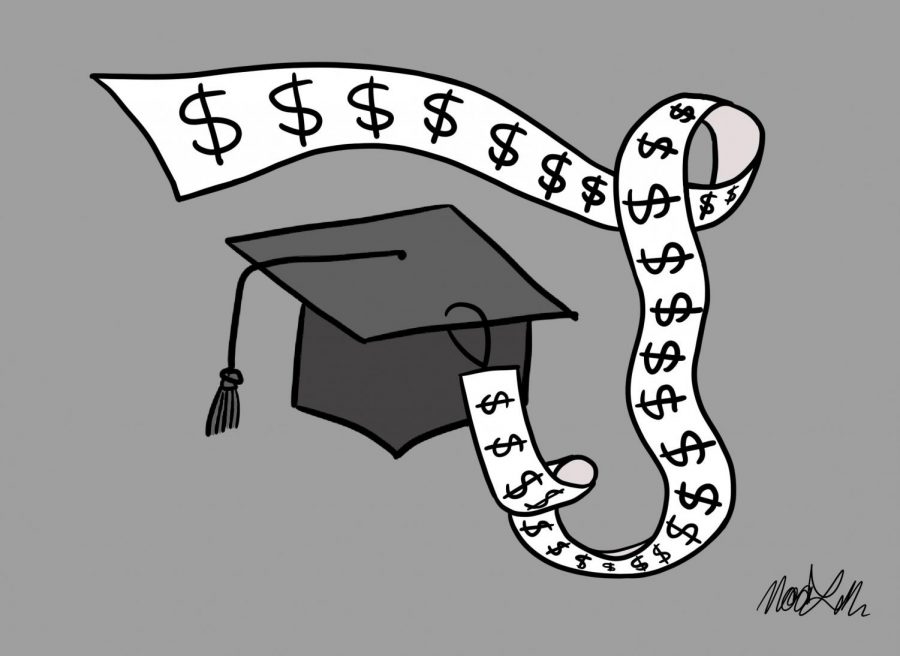The Nationwide Significance of Reducing College Tuition
October 8, 2020
This is an opinion article piece written by Anushka Elavia at Mendham who writes for Global & Domestic News. All opinions expressed in the following editorial are her own and do not necessarily reflect the views of The Patriot.
The overwhelming expenses of college in the United States prohibit millions of students from achieving a greater level of education, and therefore, tuition must be reduced. Collegiate education enables students to establish the groundwork for their futures, providing individuals with essential skills and resources. The benefits of attending college extend beyond the monetary advantages and reach to the extent of living a happier and healthier life. College authorizes students to find their purpose and passion, and then develop in those areas of interest. Unfortunately, the rising prices of universities and deficits in financial aid disable young adults from receiving an education at a greater level. In order to reduce fees, it is essential to limit access to federal student loans and reintroduce private lending. Making college accessible for students nationwide will undeniably contribute to a more educated, refined, and skilled population.
In the United States, millions of students are unable to pursue a college-level education because of the costly tuition academic institutions demand. With the cost of college doubling every nine years at an annual 8% rate of increase, low- and middle-income students are placed at an immense disadvantage. Prior to the burden of federal student loans, over 70% of colleges were deemed unaffordable for low-income students. With an expansive demographic excluded from having the means to afford college, the longstanding question arises – Why is college so expensive? Reduced state funding, increased demand for higher education, and regulations set by the U.S. The Department of Education is the primary incentive behind the prices. According to a report by the College Board, state tuition rapidly rises when government funding decreases per student. Furthermore, the demand for college has dramatically increased since 2000, as 19.7 million students were projected to attend college in 2020, as compared to 9.6 million in 2000. Evidently, increased enrollment calls for an increased faculty, and therefore, funding for salaries have escalated. This can be illustrated as an inescapable cycle, as the increasing demand for colleges results in greater tuition, resulting in larger student loans. College leaders argue that if more individuals are enrolled, then the quality and value of college education will decrease, therefore prompting more people to opt-out over the long run. They must notice, however, the even longer, more lasting effects of allowing people to attend college. If individuals receive advanced education, then the future public will be more educated and have higher political participation overall.
In order to minimize college tuition, access to federal loans must be restricted and private lending should be restored. As college education grows increasingly expensive, the need for federal student loans has also heightened. According to The College Board, prices for four-year institutions have annually increased from 4% to 6% since 2000. Nationwide, there are currently 45 million student loan borrowers, rising student loan debt to around $1.56 trillion in the United States. When a student takes out a federal loan, the money is directly distributed to the college. It then becomes the responsibility of the federal government to ensure the borrower repays the loan in full. Because the availability of federal student loans provides students with the option to attend college, colleges may be encouraged to raise their sticker prices. To control costs, the government should require colleges to keep their sticker prices below the Consumer Price Index. If they exceed the limit, then students will lose all access to federal loans. Unable to afford college, university enrollment will largely decrease, causing colleges to go out of business. Alternatively, restoring private lending will make the loan market more accountable and cause colleges to lower costs, establishing more affordable choices for students. One solution offered by colleges, in fact, is income share agreements. Those agreements provide students with financing from their colleges, and the ability to repay the funds based on a percentage of their income after graduation. With such a system, students are able to reflect on the future they are investing in.
Education is reputed as the esteemed equalizer. Reducing college tuition will, in turn, allow students from diverse economical backgrounds to establish a foundation for their futures. Illustrated in a Wall Street Journal Analysis, there, unfortunately, exists a 9% point gap of graduation rates between lower-income students as compared to their higher-income peers, considering one million students drop out of college annually due to monetary difficulties. In the present United States economy, earning a postsecondary credential stands essential for individual economic opportunity, as two-thirds of job openings require postsecondary education or training. According to the Federal Reserve Bank of New York, the average college graduate with a bachelor’s degree earned about $78,000, compared to $45,000 for the average person with only a high school diploma. The unemployment rate for college graduates is also about half the rate of high school graduates, and of those, 55% of graduates reported high levels of job satisfaction, compared to 45% of non-graduates. These statistics indicate that college further enables students to independently navigate success. Some parents argue tuition should not be reduced because college will teach students the skills of money management and budgeting. In opposition, however, students must first be educated on managing their finances before being immediately faced with the burden and stress of handling them. Attending college significantly increases the likelihood of achieving long-term financial gain, increased job satisfaction, and career stability.
The issue of excessive college tuition must be addressed immediately. In the United States especially, education should be made accessible and affordable to students of all social and economical backgrounds. College establishes a financial and personal backbone for students, guiding them in their economic endeavors. Students are allowed to explore their passions, empowered to achieve their aspirations, and encouraged to improve their communication and analytical skills. In order for colleges to reduce their fees, the federal government must take a hands-off approach with their involvement in student loans. Through financial alternatives and transparency, individuals will be better equipped to handle college funds. On the basis of equal educational opportunity for all, college tuition must collectively be reduced to be made accessible for those in pursuit of postsecondary education.










